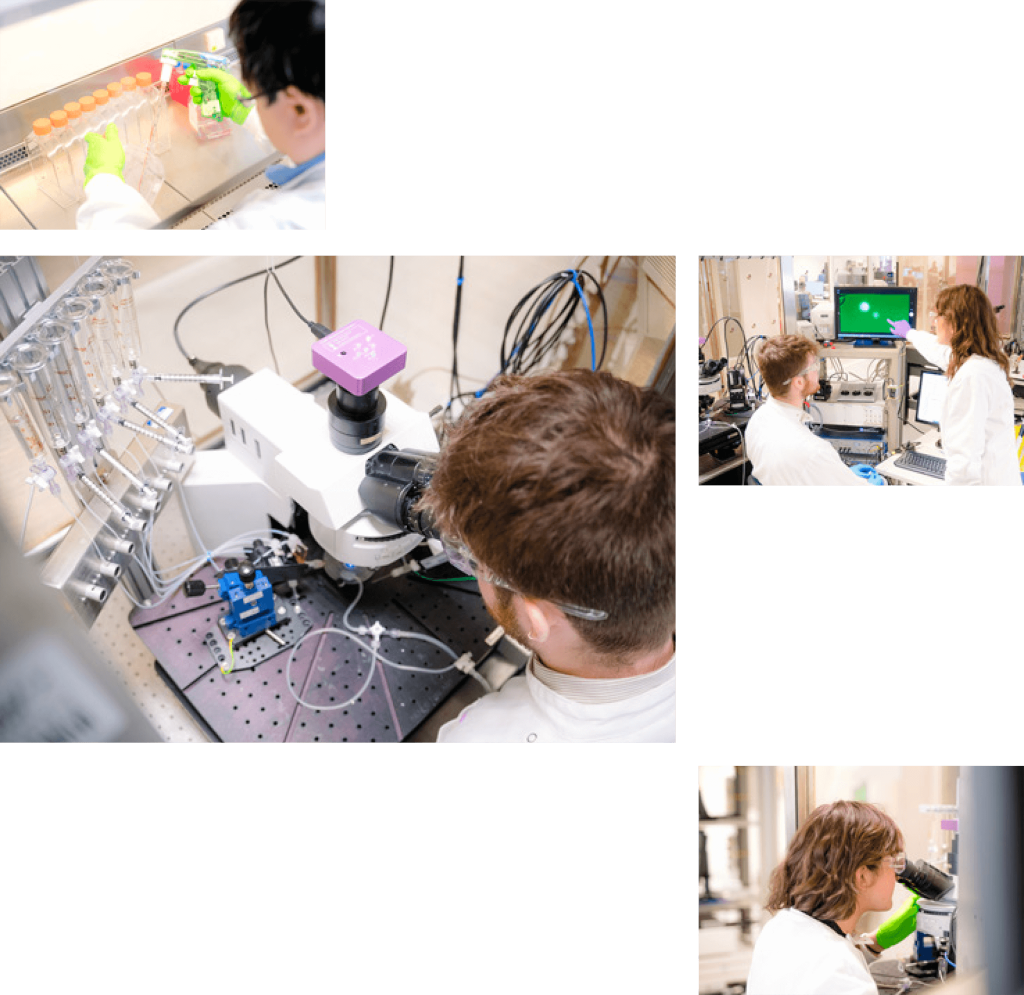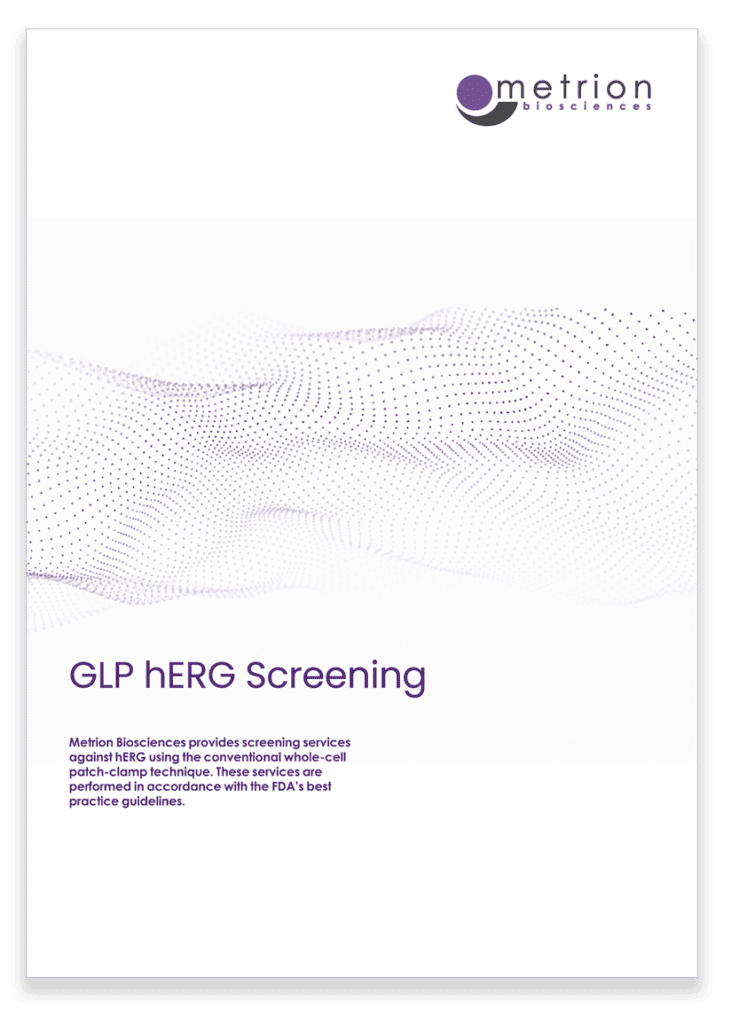

Discover the potential of GLP hERG Screening
High-quality, cost-effective compound screening for all your cardiac safety screening needs
Receive expert guidance from our dedicated team of Ion Channel Experts throughout your programme. Giving you, not only, the accurate and efficient study-related data you need in real time, but also interpretation, insight and advice to support your cardiac safety programme.
As an industry-leading CRO in Ion Channel Screening, we provide screening services against hERG using whole-cell patch-clamp electrophysiology.
Our GLP hERG screening services have been audited and approved by the UK Medicines and Healthcare products Regulatory Agency (MHRA) and are performed in accordance with the FDA best-practice guidelines. We offer high-quality, cost-effective compound screening for all your cardiac safety screening needs.
What would you like to achieve today?
Choosing the right partner
As a dedicated ion channel CRO, we have extensive experience of providing high-quality biology services for ion channel targets. We are able to do this in a cost-effective and timely manner that dovetails with your own drug discovery timelines.
Our team offers:
- Exceptional ion channel electrophysiology and drug discovery expertise
- A team of experienced cell biologists to create novel cell lines
- High-quality, cost-effective compound screening
- Detailed characterisation of lead compounds in a range of high-quality assays
- Translational services including confirmation of efficacy in stem cell and other phenotypic models
- Rapid reporting and data interpretation by highly experienced ion channel scientists
We are located within the Cambridge bio cluster, one of Europe’s largest bioscience research hubs.
Our state-of-the-art laboratories at Granta Park house high-quality facilities for native and engineered cell line and induced pluripotent stem cell culture. We have a comprehensive suite of automated patch clamp platforms, multiple manual patch clamp rigs, fluorescence-based screening capabilities and laboratory data management and reporting systems.
Our customers range from large pharmaceutical companies and established entities within the life sciences industry to smaller specialist businesses, charities, academics and start-ups looking to validate, develop or de-risk ion channel modulators as they progress towards a nomination for clinical development.
Find out more about how we can support you today.


Metrion’s Ion Channel Screening Resource Library
- Cross-site and cross-platform variability of automated patch clamp assessments of drug effects on human cardiac currents in recombinant cells.
- A systematic strategy for estimating hERG block potency and its implications in a new cardiac safety paradigm
- The Nav 1.5 Late Current in WT and Nav 1.5 ΔKPQ Mutant Channels: An Automated Patch Clamp LQT3 Electrophysiological Assay Comparison. Safety Pharmacology Society Virtual Meeting 2020.
- NaV1.5-ΔKPQ late INa current properties and pharmacology on the SyncroPatch 384i
Publications
- Ion Channel Drug Discovery and Modern Medicine.
- Ion Channel Discovery – Partnering to Access Specialized Expertise.
- Recent advances in electrophysiology-based screening technology and the impact upon ion channel discovery research.
- Clathrodin, hymenidin and oroidin, and their synthetic analogues as inhibitors of the voltage-gated potassium channels.
- Novel K+ Channel Targets in Atrial Fibrillation Drug Development – Where Are We?
- Human Electrophysiological and Pharmacological Properties of XEN-D0101: A Novel Atrial-Selective Kv1.5/IKur Inhibitor.
Videos and Presentations
- Designing multiple assay protocols for ligand gated ion channels using the stacked-tip feature on the Patchliner and SP384i platforms
- The benefits of targeting ion channels for pain and some of the hurdles in developing successful ion channel modulators.
Posters
- Identification of Novel Scorpion Venom Peptide Inhibitors of the Kv1.3 Ion Channel and their Potential as Drug Discovery Leads for Human T-Cell Mediated Disease.
- The development of a set of novel small molecule inhibitors of the Kv1.3 ion channel.
- A drug discovery collaboration between Japanese pharma and a UK SME CRO successfully developed novel small molecule inhibitors of the Kv1.3 channel to treat autoimmune disease.
Application notes and resources
- ASIC1a Ligand Gated Ion Channel Assay (App Note)
- Investigating the correlation between thallium flux and automated patch-clamp for ion channel activators.
- Identification of novel ion-channel binders: TRPA1 antagonist case study.
- The development of a set of novel small molecule inhibitors of the Kv1.3 ion channel.
- Recent advances in targeting ion channels to treat chronic pain.
- Marc Rogers (Metrion Director and Former CSO) takes part in a collaborative webinar with Nanion Technologies entitled “Validation and optimization of automated patch clamp voltage-gated Ca2+ channel assays”.
- Open access to the KCNQ channel: Retigabine and second generation M-current openers.
- Development of native and stem cell-derived electrophysiological assays for neurotoxicology screening and translational drug discovery
- Characterization of Endogenous Sodium Channels in the ND7-23 Neuroblastoma Cell Line: Implications for Use as a Heterologous Ion Channel Expression System Suitable for Automated Patch Clamp Screening.
- Optimising a difficult Nav1.8 cell line assay for automated patch clamp screening. Ion Channel Retreat, Vancouver, 2015
- Synthesis and biological evaluation of piperazine derivatives as novel isoform selective voltage-gated sodium (Nav) 1.3 channel modulators
- Action of Clathrodin and Analogues on Voltage-Gated Sodium Channels
- Novel state-dependent voltage-gated sodium channel modulators, based on marine alkaloids from Agelas sponges
- Ligand- and structure-based virtual screening for clathrodin-derived human voltage-gated sodium channel modulators
- The role of Nav1.7 in human nociceptors: insights from human induced pluripotent stem cell-derived sensory neurons of erythromelalgia patients
- Assessment of human induced pluripotent stem cell-derived cardiomyocytes for evaluating drug-induced arrhythmias with multi-electrode array
- Development of an impedance based screening assay for cardiac safety and cardiotoxicity detection in stem cell derived cardiomyocytes
- Validation of an impedance-based phenotypic screening assay able to detect multiple mechanisms of chronic cardiotoxicity in human stem cell-derived cardiomyocytes
- Electrophysiological characterisation of Cellular Dynamics International ventricular iCell2 iPSC-derived cardiomyocytes
- Functional characterisation of human iPSC-derived atrial cardiomyocytes

